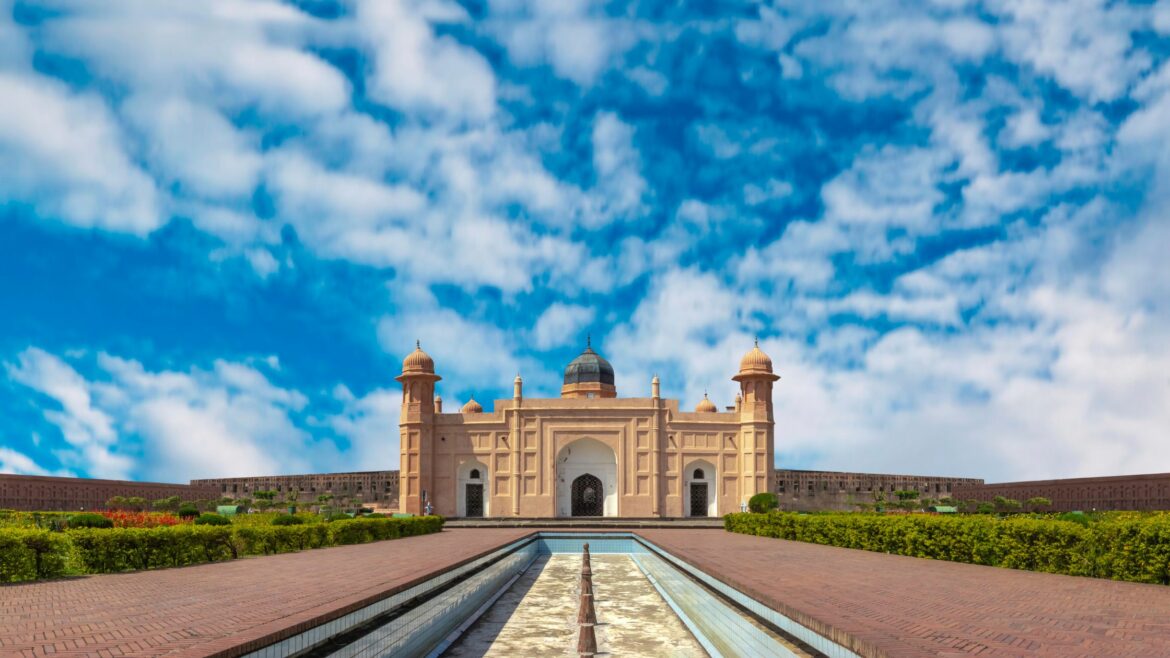With a vibrant workforce, Bangladesh is fast becoming one of Asia’s most attractive outsourcing destinations.
The average salary in Bangladesh is 312,000 BDT (Bangladeshi Taka) per year. That’s around 2,944.70 USD per year as per the April 2023 exchange rates.
If you’re looking to outsource to Bangladesh and need to understand the country’s salary structure and economy, we’ve got you covered.
In this article, we’ll examine the average salary in Bangladesh and interesting aspects like the minimum wage, salary increments, and four reasons why it’s the perfect outsourcing destination.
Lastly, we’ll also explore the four thriving industries of Bangladesh.
Let’s jump right in!
What is the average salary in Bangladesh?
The average salary in Bangladesh is around 26,000 BDT (245.39 USD) per month, which includes benefits such as rent and transportation.
This figure is much lower than the average monthly salary in western countries such as the United States (7,900 USD) and the United Kingdom (7,333 USD).
Let’s take a closer look at some interesting aspects of Bangladeshi labor statistics to see if it’s the ideal outsourcing destination for your business.
1. Average salary range
The average salary in Bangladesh ranges from 6,580 BDT (62.10 USD) to 116,000 BDT (1,094.83 USD) per month.
Note: The figures above only represent the lowest average salaries and highest average salaries. The actual maximum salary and minimum salary may be different.
2. Median salary
The median salary differs from the average salary.
How?
- The average salary adds the salaries in the sample, then divides by the number of participants.
- The median salary considers several salaries and reports the middle value in a specific set of salaries.
The median salary in Bangladesh is 24,000 BDT (226.52 USD) per month. This value means that half of the Bangladeshi population earns more than 24,000 BDT while the other half earns less than 24,000 BDT.
3. Average annual salary increment rate
Employees in Bangladesh typically receive a salary increment of 5% every 28 months.
But salary increment rates depend heavily on factors such as an employee’s performance, industry, and experience level.
Let’s examine them in detail:
A. Industry
Here are the increment rates of each industry:
| Industry | Increment Rate |
| Banking | 9% |
| Energy | 9% |
| Information Technology | 9% |
| Healthcare | 9% |
| Construction | 9% |
| Travel | 9% |
Source: salaryexplorer.com (2022)
B. Experience level
The experience level of an employee also influences the increment rate they receive.
Let’s take a look at some examples:
| Experience Level | Increase Rate |
| Top Management | 15% – 20% |
| Senior Level | 10% – 15% |
| Mid-Career | 6% – 9% |
| Junior Level | 3% – 5% |
Source: salaryexplorer.com
4. Average hourly wage
The average hourly wage in Bangladesh is around 150 BDT (1.42 USD). It means that workers generally earn 150 BDT for every hour worked.
This wage rate is significantly lower than its Asian counterparts, such as Malaysia (8.61 USD) and India (2.31 USD).
5. Minimum wage
Minimum wage rates are declared by the Government on an industry basis following recommendations by the Wages Board under the Labour Act of 2006.
The minimum wage in Bangladesh is 38 BDT (0.36 USD) per hour.
Now let’s closely explore the variables that affect salaries in Bangladesh.

5 key factors that influence salaries in Bangladesh
Here are some factors that influence the average salary distribution in Bangladesh:
1. Experience
An employee’s experience level greatly influences their earning potential.
Here’s how an employee’s salary increases according to their work experience:
- Employees with 2-5 years of experience earn about 32% more than their less experienced counterparts.
- Professionals with 5 or more years of experience earn around 36% more than their juniors.
- Employees with 10 or more years of experience earn roughly 21% more than those with 5 years of work experience.
- Professionals with 15 years or more earn around 14% more than those with 10 years of experience.
2. Education
Let’s check out how educational qualifications affect salaries:
- Employees with a certificate or diploma make around 17% more than their counterparts who only graduated high school.
- Employees who hold a Bachelor’s degree earn roughly 24% more than those with certificates and diplomas.
- Professionals with a Master’s degree make around 29% more than those with a Bachelor’s degree.
- Lastly, those with PhDs earn about 23% more than those with a Master’s degree.
3. Government vs private sector
Employees who hold positions in the public sector earn around 25% more than those who have a job in the private sector.
Here is the average salary of both public and private-sector employees.
| Sector | Average Salary (Monthly) |
| Public | 28,900 BDT(280.68 USD) |
| Private | 23,200 BDT(225.32 USD) |
Source: salaryexplorer.com
4. Job title
The average salary in Bangladesh differs according to the employee’s profession. Jobs in lucrative industries offer the highest salary.
Let’s examine the average annual salary received by some professionals:
| Job title | Average Monthly Salary |
| General manager | 48,000 BDT (466.18 USD) |
| Sales Manager | 45,200 BDT (438.99 USD) |
| Product Manager | 39,700 BDT (385.57 USD) |
| Accounting Manager | 38,700 BDT (375.86 USD) |
| Loan Officer | 33,500 BDT (325.35 USD) |
| Project Manager | 33,000 BDT (320.50 USD) |
| Electrical Engineer | 26,300 BDT (255.43 USD) |
| Mechanical Engineer | 25,700 BDT (249.60 USD) |
| Software Engineer | 25,600 BDT (248,63 USD) |
| Chartered Accountant | 23,600 BDT (229.20 USD) |
| Office Manager | 23,600 BDT (229.20 USD) |
| Web Developer | 22,600 BDT(219.49 USD) |
| Real Estate Agent | 22,600 BDT (219.49 USD) |
| Human Resource Specialist | 17,400 BDT (168.99 USD) |
| Financial Analyst | 13,700 BDT (133.06 USD) |
| Event Planner | 12,700 BDT(123.34 USD) |
| Claims Adjuster | 9,660 BDT (93.82 USD) |
Source: salaryexplorer.com
5. City
The city an employee resides in dramatically influences the average salary rates employers pay. This variation is mainly due to these cities’ varying costs of living.
Here are some average salary figures from different Bangladeshi cities.
| City | Average Monthly Salary |
| Dhaka | 29,100 BDT (274.65 USD) |
| Chittagong | 28,600 BDT (269.93 USD) |
| Bogra | 27,300 BDT (257.66 USD) |
| Coxs Bazar | 25,000 BDT (235.95 USD) |
| Jamalpur | 24,500 BDT (231.23 USD) |
| Chandpur | 23,900 BDT (225.57 USD) |
Source: salaryexplorer.com
The average monthly salary in Bangladeshi cities is much lower than in North American cities like:
Average monthly salary in Bangladesh vs the world
As we saw earlier, the average salary in Bangladesh is around 26,000 BDT (245.39 USD).
According to the World Bank, Bangladesh has a GDP per capita growth rate of 6.4%. The steady increase in average income has contributed to a remarkable drop in poverty levels.
Here’s how Bangladesh compares to other popular outsourcing countries around the world.
| Country | Average Monthly Salary |
| China | 4,257 USD |
| India | 389.10 USD |
| Philippines | 814.57 USD |
| Brazil | 1,689.43 USD |
| Mexico | 1,828.42 USD |
Source: salaryexplorer.com
Note: This article’s salary and wage estimates are just guidelines based on salary surveys. Specific salaries and wages can differ based on location, years of experience, education, job title, and other mitigating factors.
Now that we’ve thoroughly examined the labor statistics in Bangladesh, let’s explore why the country is gaining a reputation as an outsourcing hotbed.
4 compelling reasons for outsourcing to Bangladesh
Apart from the lower salary rates, several other factors make Bangladesh an excellent outsourcing destination.
Here are the top reasons you should consider outsourcing in Bangladesh.
1. Low labor costs
Bangladesh has lower salary rates that rival some of the top outsourcing hotspots in the world like, India and South Africa.
For example, the average monthly salary in South Africa is 1,678 USD, whereas the average monthly salary in Bangladesh is 245.39 USD.
The highest average pay in the Bangladeshi engineering industry is about 438.87 USD per month. In contrast, the highest average pay in the same industry in a different country, like the UK, is 127,746.26 USD per month.
This notion may be why giants like Unilever, Nestle, and P&G have set up their offices in Bangladesh.
2. Quality service
The country continues to provide reliable, quality services across sectors such as IT, human resources, and manufacturing.
The main reason for this is Bangladesh’s ever-improving digital infrastructure. In 2021, about 70% of the population had access to the internet.
Additionally, the increasing access to mobile network service and electricity ensures that more people can deliver goods and services efficiently.
3. Prepared and skilled workforce
The workforce in Bangladesh is continuously developing their skills and increasing their preparedness to provide excellent service.
There have been fruitful collaborations between the World Bank and the Bangladeshi government.
For example, the Skill and Training Enhancement project undertaken by the World Bank has equipped more than 29,700 unskilled garment workers with better skills.
In addition, programs like the Primary Education Development and Secondary Education Sector Investment have helped increase the literacy rate to 74%.
4. Favorable government schemes
The Bangladeshi government has consistently committed to introducing policies and initiatives that attract foreign investment.
In 2021, the government introduced a revenue tax exemption for Information Technology-enabled services extending until 2024.
In addition, the government’s Access to Information program boosts people’s economic and social development by using IT to improve various sectors such as agriculture and education.
Through the initiative, the government has opened 5,400 digital centres to ensure that a person can deliver quality services and develop their skill.
Next, let’s take a look at a few popular outsourcing industries.
Top 4 industries that commonly outsource to Bangladesh
Here are some of the leading sectors that regularly outsource to Bangladesh.
1. Digital marketing
With the increase of smartphones, internet connectivity and social networking in Bangladesh, the digital marketing industry is gaining momentum.
Many companies are enlisting the Bangladeshi workforce to promote their goods and services.
According to Statista, the digital advertising market in Bangladesh is projected to grow by 5.81% (2022-2027), resulting in a market volume of 404.60 million USD in 2027.
2. Information technology
According to a study by the Oxford Internet Institute, Bangladesh has over 500,000 freelancers who provide software development and various IT-related services to the global market.
Many multinational IT corporations, like IBM, and Sony, outsource their software development to the country.
The Bangladesh ICT division has recently reported that the country is only 2nd to India as an external service provider while catering to 16% of the global market.
3. Garment manufacturing
Bangladesh is the 2nd largest garment exporter in the world, with the RMG sector accounting for 84% of Bangladesh’s exports.
According to the Bangladesh Export Promotion Bureau, Bangladesh exports about 31.45 billion USD worth of apparel.
Annual revenue from the garment industry has grown from 19 billion USD to 34 billion USD in the last 7 years.
4. Business process outsourcing (BPO)
The BPO industry in Bangladesh began in 2009 and has continued to grow.
There are currently over 40,000 employees in the country, offering various BPO services such as customer support, accounting services, and telemarketing.
In 2021, the country generated approximately 85 Million USD worth of BPO-related revenue.
Wrapping Up
With low labor costs, great service delivery, and a business-friendly environment, Bangladesh is undoubtedly a leading outsourcing destination in South East Asia.
Unsurprisingly, Bangladesh is beginning to rival leading outsourcing locations such as the Philippines, and Brazil.
When considering your outsourcing locations, use this guide to gauge whether Bangladesh is the destination that can take your company to the next level.


